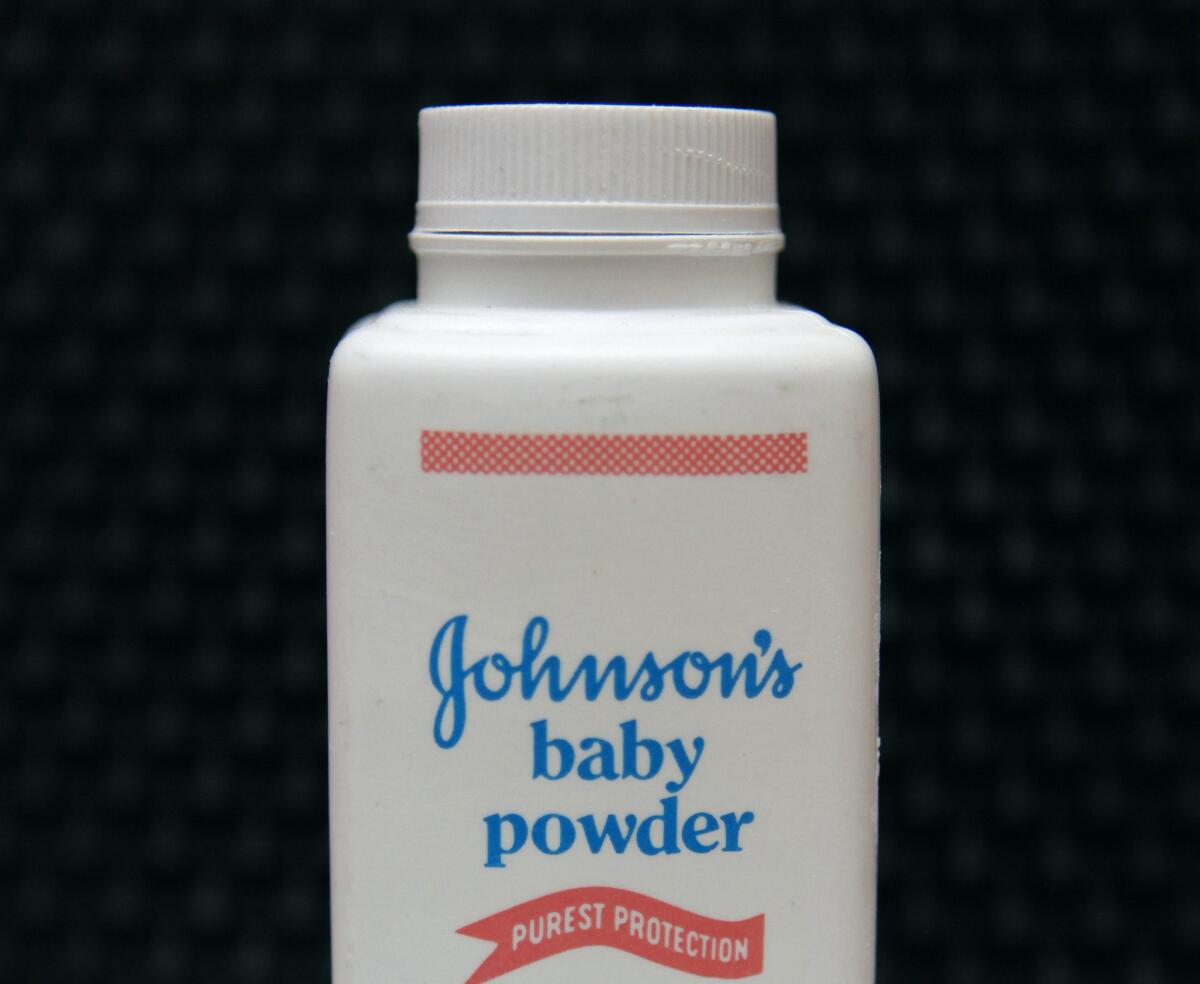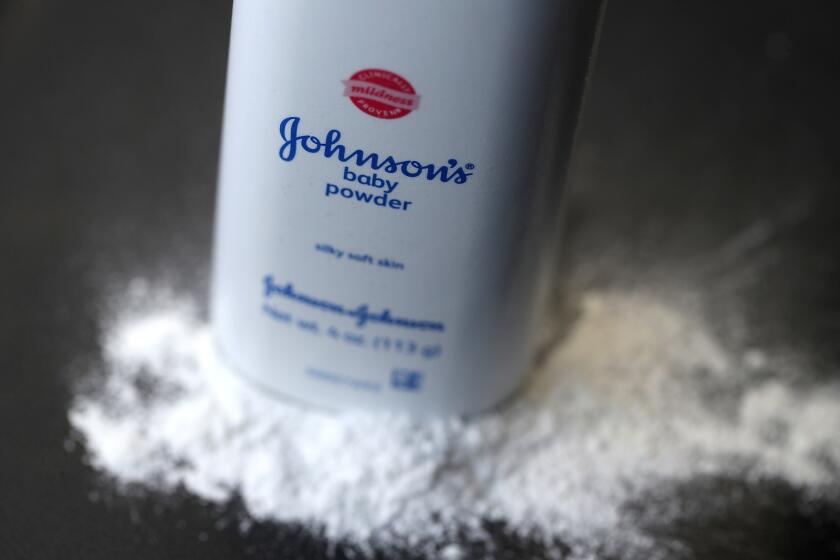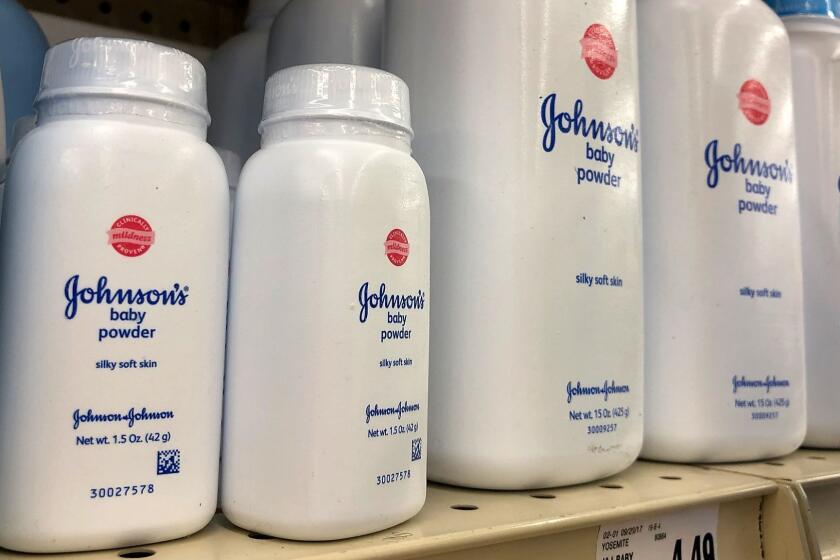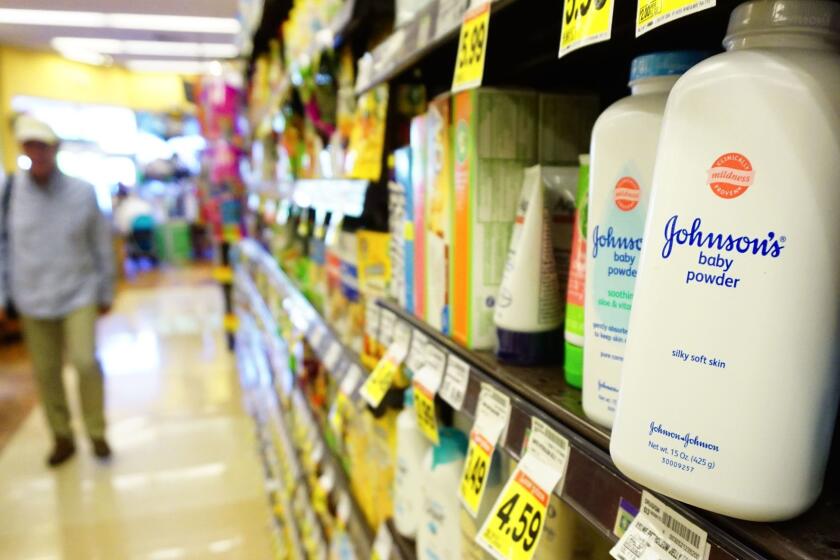Johnson & Johnson asks Supreme Court to void $2-billion talc verdict

- Share via
WASHINGTON — Johnson & Johnson is asking for Supreme Court review of a $2-billion verdict in favor of women who say they developed ovarian cancer from using the company’s talc products.
The case features an array of high-profile attorneys, some in unusual alliances, including former independent counsel Kenneth Starr, who is representing the women who sued Johnson & Johnson. The nation’s largest business groups are backing the company, and a Supreme Court justice’s father also has received attention because of his long association with a trade group for cosmetics and personal care products.
The high court could say as soon as Tuesday whether it will get involved.
At root, Johnson & Johnson argues that it didn’t get a fair shake in a 2018 Missouri trial that initially awarded $4.7 billion to 22 women who used the company’s talc products and developed ovarian cancer. A state appeals court cut the award by more than half and dropped two of the plaintiffs from the verdict but otherwise upheld the trial’s outcome.
Lawyers for both sides had presented dueling expert testimony about whether the company’s talc products contained asbestos and whether asbestos-laced talc could cause ovarian cancer. The jury found for the women on both points, after which Judge Rex M. Burlison wrote that evidence at the trial showed “particularly reprehensible conduct on the part of Defendants.”
The evidence, Burlison wrote, included that the company knew there was asbestos in products aimed at mothers and babies, knew of the potential harm and “misrepresented the safety of these products for decades.”
Johnson & Johnson resolved a woman’s claims that asbestos-laced baby powder caused her cancer before a jury got a chance to consider the allegations.
Nine of the women have died from ovarian cancer, lawyers for the plaintiffs said.
Johnson & Johnson said the verdict in the Missouri trial was “at odds with decades of independent scientific evaluations confirming Johnson’s Baby Powder is safe, is not contaminated by asbestos and does not cause cancer.” (The company also is the maker of one of three COVID-19 vaccines authorized for use in the United States.)
Health concerns about talcum powders have prompted thousands of U.S. lawsuits by women who claim asbestos in the powder caused their cancer. Talc is a mineral similar in structure to asbestos, which is known to cause cancer, and they are sometimes obtained from the same mines. The cosmetics industry in 1976 agreed to make sure its talc products did not contain detectable amounts of asbestos.
Last year, a U.S. government-led analysis of 250,000 women found no strong evidence linking baby powder with ovarian cancer in the largest analysis to look at the question, though the study’s lead author called the results “very ambiguous.”
The findings were called “overall reassuring” in an editorial published with the study in January 2020 in the Journal of the American Medical Assn. The study wasn’t definitive, but more conclusive research probably isn’t feasible because a dwindling number of women use powder for personal hygiene, the editorial said.
A few months later, Johnson & Johnson announced that it would stop selling Johnson’s Baby Powder in the U.S. and Canada, citing declining demand driven by what it called misinformation about health concerns.
The disputed link between cancer and talc is not really a part of Johnson & Johnson’s request for high court review. Instead, the company says it should have not been forced to defend itself in one trial against claims by women from 12 states, differing backgrounds and with varying histories of using Johnson & Johnson products containing talc.
The $1.6 billion in punitive damages is out of line and should be reduced, the company says in a brief written by Neal Katyal, a Washington lawyer who aligns with progressive causes and also represents corporate clients. Katyal, who was the acting top Supreme Court lawyer for a time in the Obama administration, declined an on-the-record interview.
Hiltzik: Study finds no link between talc and ovarian cancer, but don’t expect the lawsuits to stop
A new study says talc doesn’t cause ovarian cancer
The U.S. Chamber of Commerce and trade associations for manufacturers, insurers and the pharmaceutical industry are among the business organizations backing Johnson & Johnson’s appeal.
Tiger Joyce, president of the American Tort Reform Assn., pointed to how long it took the trial judge to read the jury its instructions as an indication of how unfair the trial was to Johnson & Johnson.
“When a defendant is facing a case where it takes over five hours for the judge to read the jury instructions to the jury, you just have to ask yourself what are we doing here,” said Joyce, whose group generally backs limits on liability lawsuits.
Starr said in an interview with the Associated Press that none of Johnson & Johnson’s legal arguments was worth the court’s time. “As the jury found and as every judge to review this six-week trial record has concluded, Johnson & Johnson’s conduct over decades was reprehensible,” Starr said.
In addition to Starr, other members of the women’s legal team are former Atty. Gen. John Ashcroft and Washington lawyers David Frederick and Tom Goldstein, frequent advocates before the Supreme Court.
Justice Brett Kavanaugh worked for Starr when the latter investigated the affair between President Clinton and Monica Lewinsky, which led to Clinton’s impeachment.
Another name that pops up in some documents in the case is E. Edward Kavanaugh, who was the longtime president of the Cosmetic, Toiletry and Fragrance Assn. and is the justice’s father. The association fought efforts to list talc as a carcinogen or attach warning labels to talc products. The elder Kavanaugh is retired, and the group now is called the Personal Care Products Council.
Ethicists contacted by the AP said they hadn’t seen anything that would warrant Justice Kavanaugh having to step aside from the case.
But another justice almost certainly won’t take part. Justice Samuel Alito reported last year that he owned $15,000 to $50,000 in Johnson & Johnson stock. Federal law prohibits judges from sitting on cases in which they have a financial interest.
More to Read
Sign up for Essential California
The most important California stories and recommendations in your inbox every morning.
You may occasionally receive promotional content from the Los Angeles Times.
















